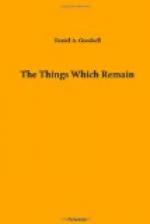Sin is blameworthy because it is born of the human preference and the human will. The nation which, knowing most of the Divine will, disobeys, is the most guilty because the most knowing. The proportion of guilt depends on the measure of knowledge and the measure of opportunity. Hence there is some guilt among those who know only a part of the truth, and if a man perceives, without the aid of revelation, a law in nature and a penalty, and breaks that law, then is he a sinner. Some of the physical consequences may apparently be avoided by future obedience. But the inner and spiritual consequences of sin are the worst—these things; namely: In the weakening of the will; in the hardening of the conscience; and, later, in the recklessness as to consequences, indicated by that terrible indictment by Paul, “Who, being past feeling, have given themselves over.” The consciousness of sin is practically universal. It is no invention of Christianity, though brought to its greatest force by Christianity. Religions, governments, literatures,—all and everywhere,—treat of sin as a fact. It is more than dominion of body over spirit; more than an incident of growth; more than a result of undeveloped judgment, tinged with emotion, and applied to questions of motive and conduct. Sin is the abnormal; sin is a variant from standard; sin is self-will and selfishness throttling duty. Where men accept a God, it is opposition to His law and government.[7] If no personal God be believed in, then sin is willful opposition to the course of nature and to law, as proved by experience. So, in every case, it is unworthy, injurious, and guilty, and must be repented of and atoned for. The doctrine of sin will never be essentially disturbed.
[Footnote 7: Cf. Clarke. Outline of Theology.]
* * * * *
[Sidenote: A Supernatural Event.]
[Sidenote: Lacks Scientific Proof.]
[Sidenote: An Old Fallacy.]
[Sidenote: A Jewish Argument.]
[Sidenote: Kant’s Reasoning.]
[Sidenote: Can Not Be Demonstrated.]
The next clause in the creed, “The resurrection of the body,” if it remains as a permanent article of faith, must rest on the declaration of Christ and on His resurrection. It is confessedly dependent, not on a natural, but a supernatural order. On this point it is again worth our while to note a concession by Huxley, as showing the consistency of one Christian truth with another. “If a genuine, and not merely subjective, immortality awaits us, I conceive that without some such change as that depicted in I Corinthians xv, immortality must be eternal misery."[8] Surely, this is a great testimony to that famous chapter on the resurrection. No scientific proof or probability can be adduced for the resurrection of the body. The older theologians used to point out that the caterpillar entombed itself that it might emerge to the higher life of the butterfly. But we must not take from




